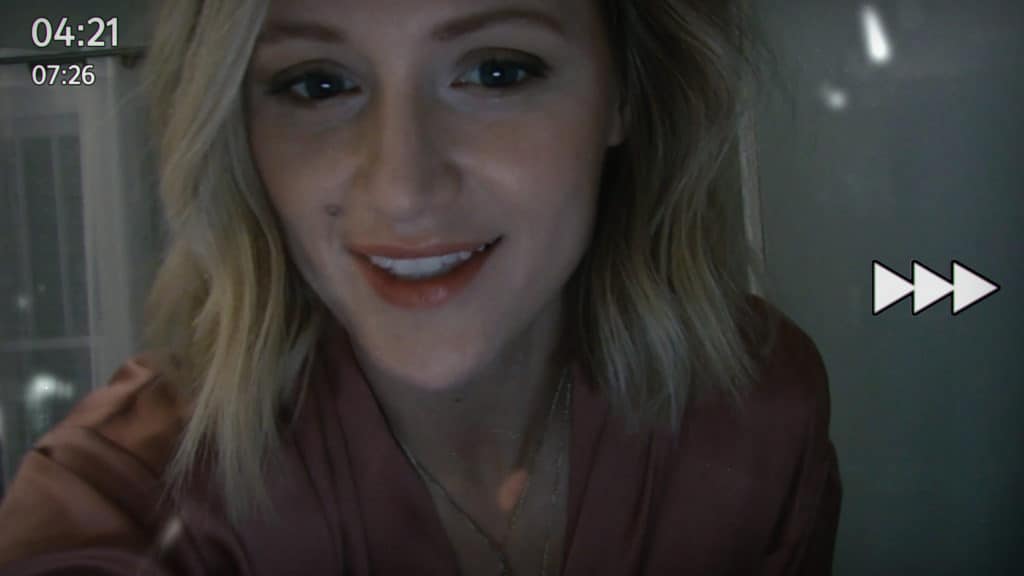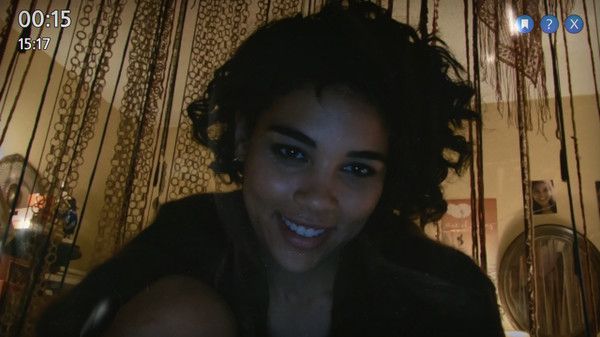You can trust VideoGamer. Our team of gaming experts spend hours testing and reviewing the latest games, to ensure you're reading the most comprehensive guide possible. Rest assured, all imagery and advice is unique and original. Check out how we test and review games here
Telling Lies, the new FMV mystery from director and writer Sam Barlow, begins with a woman who walks, with hurried focus, to her flat. Once inside, she opens a laptop and loads a program, called Retina, that allows her – and us – to pry into the private lives of others. You might think such intimate, and normally unattainable, access would push us toward the prickling verges of voyeurism, but Barlow has built something more subtle. It doesn’t seem like we are sneaking in and snooping around; it’s more as though we have slipped into the stream of each narrative like a reader, not a trespasser, and that our access to these small moments is borne of unsullied curiosity. It’s a game that feels, despite its title, honest.
In similar fashion to Barlow’s last game, Her Story, we see one side of a conversation, severed from the whole; here, though, we have the opportunity to go hunting for the other half of the video chat. In an implausible touch, this can only be done by searching out keywords or phrases – thus hauling up a number of videos in which they are spoken. Such a quirk seemed somewhat more reasonable in Her Story, which was set in 1994 – a time as far back and ornate, in software terms, as the Baroque period. Here, though, it seems an unlikely contrivance. Still, the formula remains compelling; rather than dig through a data dump of files, you feel about for common strains and secrets dissembled in the drama. A new name might spring loose and put you on a different scent. Or the sight of a hand, pressed against a pregnant belly, might birth a slew of possible search terms.
You get the sense of a story spilled out, like the pieces of a jigsaw, and you start looking for streaks of colour to clump the tiles into groups. You also develop a knack for intuiting future events from the disorder. It will be a familiar feeling to readers of William Burroughs, who scrambled and spliced his writing into a fresh, chaotic order, and claimed it offered precognitive insights. ‘Perhaps events are pre-written and pre-recorded and when you cut word lines the future leaks out,’ he wrote. I always assumed Burroughs was mad – which, of course, he was – but I finally see what he was getting at. I wonder what he would make of Telling Lies; would he hail it as an electronic revolution?

I also found myself, as more of the game took shape, reminded of Christopher Nolan’s Memento – another enigma with a chronic aversion to chronology. That film, about an amnesiac trying to find his wife’s murderer, ran backwards through blind spots of plot and charged us with contextualising all the clues. I was stirred by the same question now that prodded at me then: is the tale as good as the telling? Barlow co-wrote Telling Lies with Amelia Gray, whose previous work includes writing for Maniac and Mr. Robot. And you can feel the fresh air coming in, as the cleverness of Barlow’s conceit is driven in new directions. The biggest difference from Her Story, whose focus – cramped and glaring – was fixed on a single subject, is that Barlow’s attention has widened into a web of connected souls.
First, we have Kerry Bishé, as a nurse who is stalled and stressed, caring for a child while still in her scrubs. Then there is Logan Marshall-Green, who plays an unpleasant man named David; this comes naturally to Marshall-Green, who already played an unpleasant man, named Trey, in The O.C. David has been derailed by his quest for something, which is kept from our reach early on. This brings him into the orbit of two women. The first is a sex worker, played by Angela Sarafyan, whose willowy presence and probing questions get to the heart of the game’s themes – ‘how do I know you are telling the truth?’ she asks. How indeed. The second is a restless young woman, played by Alexandra Shipp, who once dreamt of fame but has tempered her ambitions. ‘I’ve learned that maybe there’s nothing wrong with being ordinary,’ she says. ‘Ordinary can be magical.’
And so to the lies, of which there are, apparently, 97 – ‘96 small lies’ and ‘1 big lie,’ according to the trailer. But despite the scrubbing tool, with which you comb back and forth, and the tags that you label and log each video with, I found my hunger for hunches dying off. Besides, who was I that I had the right to go rooting around? The master stroke of Telling Lies – the real 1 big lie – is the one that you tell, over and over: that you are a part of these lives. Your character’s very presence, which you are reminded of by the reflection, glimpsed in the gloss of her laptop screen, is surely the greatest dishonesty. Only, it never feels dishonest, owing to the way your gaze is always met, your inclusion instinctively implied. I soon found myself less interested in the uncovering of lies and more in what was telling about the telling.

At one point, someone says that people tend to ‘save their lies for the people that matter, their wives, their bosses.’ Indeed, you soon become attuned to deceptions not only big and small but deep and damaging. Scattered mention is made of fairy tales. One character apologises for pulling a Cinderella act, rushing out of a party early; another, stirring from slumber, compares herself to Sleeping Beauty; and someone else uses ‘Prince Charming’ as an online persona. In an innocent moment, we are told of a young girl gifted a box set of Disney princess movies – a bundle of beautiful lies that might just lead people to wish their way into frustration, when reality fails to deliver.
As such, it is a shame that Barlow and Gray seem to think that the parts of Telling Lies most rooted in reality lack in the delivery of thrills. Sadly, the plot feels the need for a grand conspiracy, and some explosive bursts of action, which all feel oddly false in the face of more lowly troubles elsewhere. I found myself, late in the game, flitting back to earlier moments and being held rapt by the simple strains of a relationship, tested by distance; or of being sung to, late at night; or in hearing people talk of films. All are moments that rustle with deceit, and stitching these strands together was adventure enough. It’s no surprise – and no bad thing – that Barlow’s ambitions have bloomed since Her Story, but there are times, in Telling Lies, where he seems in need of a reminder: ordinary can be magical.
Developer: Sam Barlow, Furious Bee Limited
Publisher: Annapurna Interactive
Available on: PC [reviewed on]
Release Date: August 23, 2019
To check what a review score means from us, click here.
Telling Lies
- Platform(s): iOS, macOS, Nintendo Switch, PC, PlayStation 4, Xbox One
- Genre(s): Adventure, Indie, Simulation










